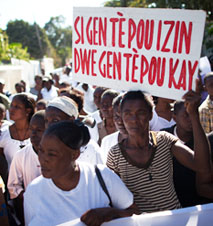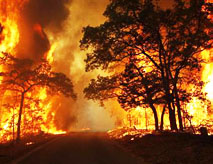
Occupying Hawaii: Paradise Lost and Found
Hawaii seems both the unlikeliest and most appropriate location for the Occupy movement to appear and Occupy groups have popped up on all the major islands.

Hawaii seems both the unlikeliest and most appropriate location for the Occupy movement to appear and Occupy groups have popped up on all the major islands.

Source: The Nation
In late September 2001, I was living in a tent in Lower Manhattan with the 2nd Battalion, 25th Marines, a reserve unit just outside the city. We were occupying Battery Park, which at the time served as the National Guard’s headquarters. “Guarding the guard,” we called it.
The two weeks I spent there were profoundly affecting. There I was, at the center of the world, watching America at its finest, showing at once nearly impossible perseverance and limitless compassion. Generosity sprouted everywhere throughout New York City; people gave out food, shoe inserts, massages, coffee, flowers, hugs, kind words and anything you needed. I told someone I liked Red Bull, and hours later he came to my tent, dragging a handcart with eight cases of the stuff. I would slip one under each of the other marines’ pillows while they slept, and when we woke up for guard duty I would say the Red Bull fairy had come.

Howard’s remarkable life and work are summarised best in his own words. His primary concern, he explained, was “the countless small actions of unknown people” that lie at the roots of “those great moments” that enter the historical record – a record that will be profoundly misleading, and seriously disempowering, if it is torn from these roots as it passes through the filters of doctrine and dogma. His life was always closely intertwined with his writings and innumerable talks and interviews. It was devoted, selflessly, to empowerment of the unknown people who brought about great moments. That was true when he was an industrial worker and labour activist, and from the days, 50 years ago, when he was teaching at Spelman College in Atlanta, Georgia, a black college that was open mostly to the small black elite.
While teaching at Spelman, Howard supported the students who were at the cutting edge of the civil rights movement in its early and most dangerous days, many of whom became quite well-known in later years – Alice Walker, Julian Bond and others – and who loved and revered him, as did everyone who knew him well. And as always, he did not just support them, which was rare enough, but also participated directly with them in their most hazardous efforts – no easy undertaking at that time, before there was any organised popular movement and in the face of government hostility that lasted for some years. Finally, popular support was ignited, in large part by the courageous actions of the young people who were sitting in at lunch counters, riding freedom buses, organising demonstrations, facing bitter racism and brutality, sometimes death.

The League of Arab States Observer Mission to Syria is in an administratively critical time with the Observer Mission members from Saudi Arabia and the Gulf Cooperation Council States of Bahrain, Kuwait, Oman, Qatar, and the United Arab Emirates leaving.

Although political and social divisions have long fissured Haitian movements, organizations from across historic divides are demanding many of the same things. One clear, common emphasis is the immediate need for land and housing for the displaced.

The onset of ever more extreme and repeated weather events is likely to change how we think about the role of the state.
Copyright Toward Freedom 2019